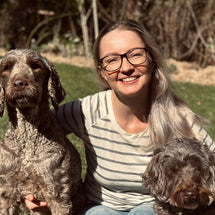Spring Pet Safety Tips for a Happy and Healthy Season

Well friends, it’s Springtime! As you get out the rubber gloves and feather duster, read our list of these common household hazards and follow our cleaning tips to keep your dog safe.
Hazards for your dog, such as chemicals, poisons or other dangers, can lurk in your kitchen, bathroom, storage cupboards, bedroom, garage or in the garden.
Certain toxins can be harmful when in contact with the skin or licked up in the case of a spill or just straight up curiosity.
Room-by-room offenders
Kitchen
-
Defrosting the freezer can reactivate harmful bacteria lying dormant in frost or food products
-
Rat bait when ingested can cause life-threatening bleeding. Even consuming a dead rat or mouse is toxic for your dog.
-
Drain cleaners
-
Dishwasher powder is caustic, meaning when licked, it can burn your dog’s tongue, throat and oesophagus

Bathroom
-
Bathroom, shower or tile cleaners are often left for a few minutes to take action, and a curious doggo may just take a lick of the shower tiles to investigate. Best to keep your pooch out of there!
Bedroom and storage cupboards
-
Medications – almost all human medicines are poisonous to dogs, given their smaller weight and different metabolic processes
-
Essential oils such as eucalyptus oil or tea tree oil in high concentrations can be poisonous.
Garage
-
Antifreeze – a sweet-tasting liquid commonly used in cars during the wintertime. This toxin causes kidney failure and acidosis
-
Motor oils
-
Lead (often found in very old paint or petrol containers)
Garden

-
Plants and flowers that can be hazardous may be present in your garden all year round. Bloomers like Yesterday-today-tomorrow, Foxglove Azalias and Oleander can be particularly toxic if ingested. Pollen may cause skin and respiratory allergies in our pets
-
Fertilisers can be unusually luring for dogs. Blood and bone meal can have toxic levels of iron or harmful bacteria. Fertilisers can also contain Pesticides such as snail bait or insecticides, which can lead to neurological symptoms and even death, or Weed killers such as Paraquat are directly toxic to the lungs and kidneys
-
Swimming pool salt consumption can cause salt toxicity, a severe neurological disorder in dogs
-
Fungus ingested or inhaled mycotoxins can result in varied presentations such as liver, respiratory and dermatological conditions.

The wonderful warmer months can also awaken some serious creepy crawlies in your garden, like venomous snakes and paralysis ticks. Seek veterinary attention immediately if something is suspicious.
- Snake envenomation can progress rapidly, or may even be delayed for up to 24 hours, but can be fatal. Signs of envenomation include sudden collapse, vomiting, and unsteady walk (ataxia).
-
Tick paralysis symptoms can be varied, presenting subtly from a hoarse bark, vomiting, unsteady walk, to complete paralysis and respiratory failure if left untreated. Paralysis ticks are sneaky and can be very difficult to find if attached to your dog’s skin.
Achoo! Seasonal allergens
For many of us, Spring means popping anti-histamines daily. Our furry friends can also suffer from seasonal allergies. Many skin allergies in dogs are caused by airborne allergens such as:
-
Pollen
-
Grass seeds
-
Mould spores
-
Certain trees
-
Dust mites
As spring gives way to warmer days, it’s important to understand the dangers of summer for dogs. From scorching pavements to the risk of dehydration, extra care is needed to keep them safe.
Reduce the risk! Dog-proofing tips for your home

Be safety savvy to protect your doggo from exposure to toxins and poisons in the home. Unfortunately, chores still need to be done, so here are a few steps you can take:
- Get outdoorsy: Keep your dog away from the danger zone! A friend or family member can take your dog outside for a walk or play while you get down and dirty indoors
- Alternatives: Choose less harmful cleaning products such as vinegar and baking soda
- Storage: Store all chemicals and poisons in their original containers, locked away out of your dog’s reach, and safely dispose of any that you no longer use
- Remove: Wipe and rinse products off surfaces as soon as possible, and keep the dishwasher closed (no more licking dinner scraps!)
- Pest control: Check nooks and crannies for pest control, such as rat and cockroach baits. Dispose of them directly into the council bin, or, if they must be used, ensure they are stored out of reach and check them regularly.
- Garden: Mow the lawn and take garden waste piles to the dump – ticks and snakes hide and thrive in long grass
-
Be methodical: Rather than opening up cupboards all throughout the house at once, stick to one room at a time so you can keep a close eye on your cleaning products.
What to do if you suspect contact with a toxin
If you think your dog has come into contact with a toxic substance,
- Call a veterinarian straight away – don’t wait for symptoms to appear
If you can’t get a hold of a vet, try the Poisons Information Centre on 131 126 in the meantime.
- Do not attempt to treat your dog without correct advice from your veterinarian
- Keep the bottle/container of the substance handy – the components list will be valuable
-
Make note of the time and the amount exposed to (if known)
Happy Cleaning!
When it comes to spring cleaning, it's important to choose natural, pet-friendly options to keep your dogs safe. Avoid using harsh chemicals like bleach, ammonia, phenols, and formaldehyde, as these can be harmful to pets.
Instead, opt for cleaners made with natural ingredients such as vinegar, baking soda, and lemon juice. These alternatives are not only effective but also safer for your pets, ensuring a clean and healthy home environment!






